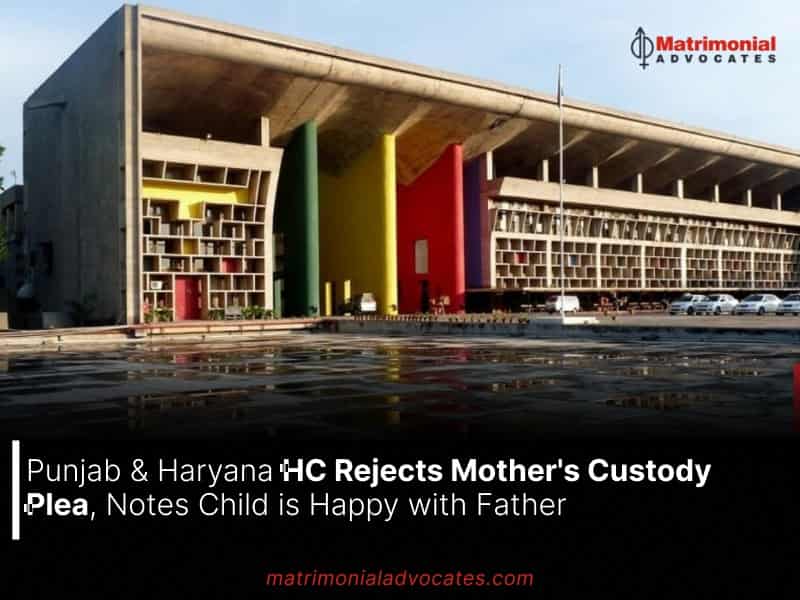
The Punjab & Haryana High Court was considering a Revision Petition against an order of the Family Court by which the Application filed by the Petitioner for grant of interim custody of the minor child was dismissed.
The Punjab & Haryana High Court refused to transfer the custody of a three-year-old child from his father to the mother, observing that the child appeared content with the father and that relocating him at this juncture would not be in his best interests.
The Court was considering a revision petition challenging the Family Court’s decision, which had earlier rejected the petitioner’s plea for interim custody of the minor.
The single bench of Justice Vikram Aggarwal observed, “There is an allegation levelled against the petitioner by the respondent about her involvement with another girl. Though, such allegations are common in matrimonial disputes and parties often level allegations and counter allegations, upon interaction with the respondent, it was found to be his concern about the said alleged relationship. Under such circumstances, in the considered opinion of this Court, for the present, the welfare of the child would be to remain with the respondent.”
Facts of the Case
Owing to marital discord, the child’s parents initiated divorce proceedings under Section 13-B of the Hindu Marriage Act, 1955. They reached an amicable settlement concerning dowry items, alimony, and maintenance. As part of this agreement, the mother transferred custody of the minor child to the respondent and consented not to seek custody or visitation rights in the future. Both parties were documented as being bound by this custody arrangement.
Subsequently, however, the petitioner approached the Family Court, expressing her unwillingness to continue with the divorce and seeking custody of the child. She asserted that she had not fully understood the implications of the custody agreement, claiming that her parents had misled her into believing the child was being sent only for a temporary visit. The divorce petition filed under Section 13-B was eventually dismissed, and an appeal against this dismissal is presently pending before the Division Bench.
Thereafter, the petitioner filed a custody application under Section 7 read with Section 25 of the Guardians and Wards Act, 1890. The respondent contested the petition by submitting a written statement. The petitioner also moved an application seeking interim custody of the minor, which was similarly opposed and ultimately dismissed through the impugned order.
During the proceedings, the petitioner’s counsel contended that the child, being 3.5 years old, falls within the age group where custody is generally presumed to be more appropriate with the mother. It was argued that a child of such tender age should not be separated from the mother, and in view of the child’s welfare, interim custody ought to be granted to her. The counsel relied upon Section 6 of the Hindu Minority and Guardianship Act, 1956, along with Supreme Court precedents in Roxann Sharma v. Arun Sharma (2015) and Pushpa Singh v. Inderjit Singh (1990).
Reasoning By Court
At the outset, the Court acknowledged the established legal principle that custody of a minor under the age of five generally rests with the mother. However, it clarified that the central issue was whether the present case aligns with ordinary circumstances warranting such custody, or whether exceptional considerations exist that justify denying interim custody to the mother—especially since the primary custody petition remains pending before the Family Court.
Upon reviewing the facts, the Court held that interim custody should continue with the father. It rejected the petitioner’s assertion that the child’s custody had been transferred without her knowledge, deeming the claim untenable, particularly in light of the petitioner’s educational background, which made it unlikely that she could have been misled in such a manner.
Additionally, the Court noted that allegations of extramarital relationships are frequently raised in matrimonial conflicts, and in this instance, the petitioner had not presented any specific or credible evidence to support such claims.
“The custody of the child is with the father for the last more than one year now. To forcibly give the interim custody of the child to the mother at this stage may have an adverse impact on the mental well being of the child who, as already noted, appeared to be quite comfortable in the custody of the father. Keeping in view solely the welfare of the child in mind at this stage, I do not deem it appropriate to grant the interim custody of the child to the petitioner,” the Court observed.
Consequently, the petition was dismissed.





